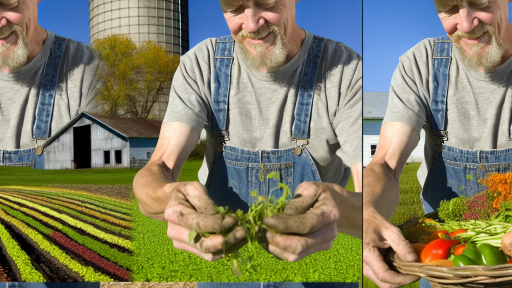Definition and Importance of Ethical Farming for Small Farms
Understanding Ethical Farming
Ethical farming prioritizes the well-being of communities and ecosystems.
This practice emphasizes sustainable agriculture methods.
Moreover, it recognizes the importance of animal welfare.
Ethical farming promotes fair labor practices for all workers.
Additionally, it supports local economies and food systems.
The Role of Small Farms
Small farms play a crucial role in ethical farming practices.
They often focus on quality over quantity.
These farms build personal relationships with their customers.
Such connections foster trust and transparency in the food supply chain.
Furthermore, they can implement diversified cropping systems effectively.
The Impact on the Environment
Ethical farming benefits the environment significantly.
It helps combat soil degradation and promotes biodiversity.
This approach reduces chemical inputs and encourages organic practices.
Moreover, it can mitigate climate change effects through carbon sequestration.
Lastly, it leads to healthier ecosystems and resilient agricultural systems.
Transform Your Agribusiness
Unlock your farm's potential with expert advice tailored to your needs. Get actionable steps that drive real results.
Get StartedCommunity Benefits
Ethical farming enhances community health and well-being.
It provides fresh and nutritious food to local populations.
Additionally, it encourages community engagement and education.
This practice can create job opportunities in rural areas.
Moreover, it fosters a sense of community pride and stewardship.
Principles of Sustainable Agriculture
Balancing Production and Conservation
Sustainable agriculture equally values production and conservation efforts.
Farmers aim to produce food while protecting natural resources.
This balance leads to healthier ecosystems and resilient farms.
Conservation Practices
Implementing conservation practices is essential for sustainable farming.
Crop rotation enhances soil fertility and reduces pests.
Cover cropping prevents erosion and improves soil structure.
Additionally, agroforestry combines crops with trees for mutual benefits.
Responsible Resource Management
Efficient resource management enhances sustainability in agriculture.
Water conservation practices maintain necessary water supplies.
Farmers should employ techniques like drip irrigation to minimize waste.
Moreover, using organic fertilizers reduces chemical run-off into waterways.
Community Engagement
Engaging with the local community strengthens sustainable farming efforts.
Farmers can share resources and knowledge with each other.
Community-supported agriculture (CSA) connects farmers directly with consumers.
This approach fosters local economies and reduces transportation emissions.
Research and Innovation
Continuous research is vital for improving sustainable agricultural methodologies.
Farmers must stay updated on innovative practices and technologies.
Furthermore, collaborating with research institutions can yield promising results.
Innovations in crop breeding can enhance resilience to climate change.
Showcase Your Farming Business
Publish your professional farming services profile on our blog for a one-time fee of $200 and reach a dedicated audience of farmers and agribusiness owners.
Publish Your ProfileImpact of Ethical Farming on Local Communities and Economies
Strengthening Local Economies
Ethical farming significantly boosts local economies.
It creates job opportunities for local residents.
Farmers often source supplies from nearby businesses.
This practice keeps money circulating within the community.
Improving Community Health
Ethical farming promotes healthier food choices.
Locally grown produce contains fewer pesticides.
Communities benefit from fresh, nutritious food sources.
Increased access to fresh foods can reduce diet-related diseases.
Building Stronger Community Bonds
Community-supported agriculture fosters closer relationships.
Members establish bonds through friendships and shared values.
Farmers engage directly with consumers through events.
This interaction strengthens local networks and support systems.
Environmental and Social Benefits
Ethical farming practices preserve local ecosystems.
These practices reduce reliance on imported goods.
Consequently, they lower the carbon footprint of food distribution.
Moreover, they support animal welfare and humane treatment.
Education and Awareness
Ethical farms often serve as educational hubs.
They provide workshops and farm tours to the public.
Such activities raise awareness about sustainable practices.
Communities learn about the benefits of ethical consumption.
Gain More Insights: Creating Memorable Experiences in Agri-Tourism
Techniques for Implementing Ethical Practices on Small Farms
Adopting Organic Farming Methods
Organic farming practices emphasize using natural inputs.
These techniques improve soil health and crop productivity.
Farmers can enhance biodiversity by rotating crops regularly.
Utilizing compost helps recycle nutrients back into the soil.
Supporting Local Ecosystems
Small farms play a crucial role in local ecosystems.
Planting native crops encourages local wildlife and pollinators.
Additionally, maintaining hedgerows provides shelter for beneficial insects.
Integrating livestock can help manage weeds and pests naturally.
Practicing Fair Trade Principles
Farmers should ensure fair wages for all workers.
Building direct relationships with consumers fosters transparency.
Participating in fair trade certification strengthens market access.
This approach supports sustainable community development.
Implementing Water Conservation Strategies
Effective water management is vital for small farms.
Using drip irrigation reduces water waste significantly.
Rainwater harvesting systems can supplement irrigation needs.
Mulching helps retain soil moisture and reduce evaporation.
Promoting Education and Community Involvement
Education empowers farmers to adopt ethical practices.
Participating in local agricultural workshops fosters knowledge sharing.
Community-supported agriculture (CSA) initiatives strengthen local ties.
Showcase Your Farming Business
Publish your professional farming services profile on our blog for a one-time fee of $200 and reach a dedicated audience of farmers and agribusiness owners.
Publish Your ProfileEngaging consumers stimulates interest in sustainable farming.
Find Out More: Organic Farming Tips for Community Supported Agriculture
Certification and Labeling
Understanding Organic Standards
Organic farming emphasizes sustainability and environmental health.
This method avoids synthetic chemicals and genetically modified organisms.
To be certified organic, farmers must adhere to specific guidelines.
The USDA regulates organic certification in the United States.
Farmers must maintain their organic status through regular inspections.
Consumers rely on organic labels for their purchasing decisions.
Thus, understanding these standards is crucial for ethical farming.
Understanding Ethical Standards
Ethical farming goes beyond organic practices.
It prioritizes animal welfare, fair labor practices, and environmental stewardship.
Farmers often seek certifications that reflect their ethical commitments.
The Certified Humane label ensures animals are treated with respect.
Fair Trade certification promotes equitable trading conditions for farmers.
Both labels help consumers identify truly ethical products.
The Importance of Certification
Certification provides transparency and accountability in farming.
It helps consumers make informed choices about their food sources.
Consequently, it encourages farmers to adhere to high standards.
Furthermore, certifications often lead to higher market prices.
They also open access to niche markets focused on ethical consumerism.
Labeling Practices
Clear labeling benefits both consumers and farmers.
Effective labels communicate essential information about products.
Common labels include “organic,” “non-GMO,” and “locally sourced.”
Transparency in labeling builds trust between consumers and producers.
Farmers should ensure their labels accurately reflect their practices.
This accountability strengthens the ethical farming movement.
Delve into the Subject: Exploring Agri-Tourism: Benefits for Modern Farmers

Animal Welfare Considerations in Small Scale Farming Operations
Importance of Animal Welfare
Animal welfare is crucial to ethical farming practices.
It affects both the animals’ quality of life and farm productivity.
Moreover, consumers increasingly demand high welfare standards.
Basic Welfare Needs
Animals require adequate space to move freely.
They also need clean and comfortable shelter.
Access to clean water and nutritious food is essential.
Social interaction should be encouraged among animals.
Stress and Its Implications
Stress negatively influences animal health and behavior.
Thus, farmers should recognize signs of stress in animals.
Common signs include vocalization, aggression, and withdrawal.
Implementing Welfare Standards
Small farms can adopt welfare accreditation programs.
For instance, the Animal Welfare Approved program offers guidelines.
Regular training improves staff awareness and animal handling.
Showcase Your Farming Business
Publish your professional farming services profile on our blog for a one-time fee of $200 and reach a dedicated audience of farmers and agribusiness owners.
Publish Your ProfileEnvironment and Welfare
The environment impacts animal welfare significantly.
Natural light and ventilation enhance animal comfort.
Farms should minimize overcrowding to reduce stress.
Monitoring and Improving Welfare
Farmers must regularly assess their animals’ well-being.
Documenting health issues allows for timely interventions.
Moreover, feedback from consumers can guide welfare improvements.
Uncover the Details: Permaculture Strategies For Sustainable Farming
Challenges and Barriers Small Farmers Face in Adopting Ethical Practices
Financial Constraints
Small farmers often face tight budgets.
Initially, ethical farming practices can be more expensive.
Consequently, many farmers struggle to cover these costs.
Additionally, access to funding can be limited.
Many small farms do not qualify for large grants.
Furthermore, obtaining loans can be difficult for them.
Knowledge and Education Deficits
A lack of information hinders ethical farming adoption.
Some small farmers may not understand ethical practices.
Moreover, access to workshops or training may be limited.
This gap can deter farmers from changing their methods.
Consequently, they may continue using conventional practices.
Market Access and Demand Issues
Finding buyers for ethically produced goods can be challenging.
The demand for such products varies greatly by region.
Moreover, small farmers may lack marketing skills.
This issue reduces their ability to reach potential customers.
Additionally, competition from larger farms can be fierce.
Regulatory and Policy Challenges
Navigating regulations can be overwhelming for small farmers.
Different policies can complicate the adoption of ethical practices.
Moreover, compliance with various standards adds complexity.
Some farmers may not have the resources to meet these regulations.
Additionally, political shifts can impact support for small farms.
Social and Cultural Barriers
Cultural beliefs can influence farming methods.
Many farmers cling to traditional practices out of habit.
Furthermore, peer pressure can discourage change.
Some may fear losing community support if they innovate.
This resistance can delay the transition to ethical farming.
Future Trends in Ethical Farming: Innovations and Technologies
Embracing Precision Agriculture
Precision agriculture revolutionizes how farmers manage their land.
This approach utilizes data analytics to enhance crop yields.
Farmers can monitor soil health and moisture levels in real-time.
Consequently, they make informed decisions about resource use.
Ultimately, this method reduces waste and environmental impact.
Integrating Sustainable Practices
Various farms are adopting regenerative agriculture techniques.
This style focuses on improving soil health and biodiversity.
Showcase Your Farming Business
Publish your professional farming services profile on our blog for a one-time fee of $200 and reach a dedicated audience of farmers and agribusiness owners.
Publish Your ProfileCover cropping is gaining traction among small farmers.
By planting cover crops, they enhance soil structure and fertility.
Furthermore, reducing chemical input fosters a healthier ecosystem.
Utilizing Advanced Technology
Advanced technologies greatly impact small farm operations.
For instance, drones monitor crop health and growth patterns.
They can quickly identify areas needing attention.
Moreover, automation is enhancing labor efficiency on farms.
This shift allows farmers to focus on strategic decision-making.
Adopting Aquaponics and Hydroponics
Aquaponics combines aquaculture and hydroponics in a sustainable system.
This method maximizes resource use while minimizing waste.
Hydroponics, on the other hand, allows soil-less plant growth.
Both practices enable year-round crop production with less land.
Enhancing Transparency with Technology
Blockchain technology is increasing transparency in farming.
Farmers can track their products from farm to table.
This traceability builds consumer trust and supports ethical practices.
Retailers are increasingly demanding verified sustainable sourcing.
Fostering Community Supported Agriculture
Community Supported Agriculture (CSA) is growing in popularity.
Consumers directly support local farms by purchasing shares.
This direct connection strengthens community ties and promotes sustainability.
Furthermore, it offers farmers a steady income throughout the season.
Additional Resources
I Spent a Day Watching Your Steak Die | Bon Appétit
What it Takes to Make a Decent Living Raising Ethical Meat | Civil Eats




